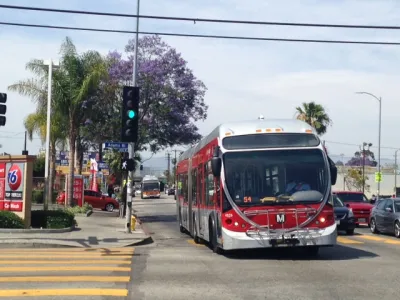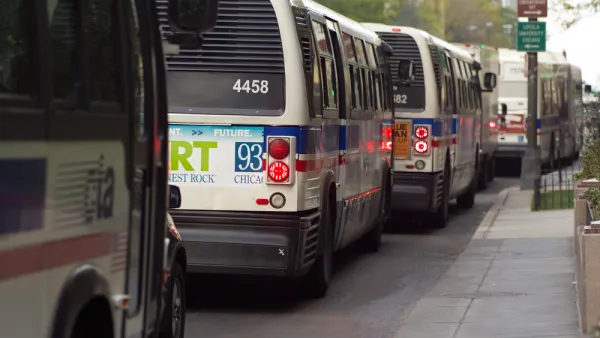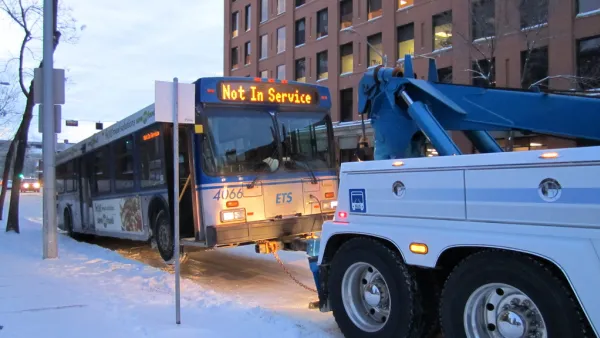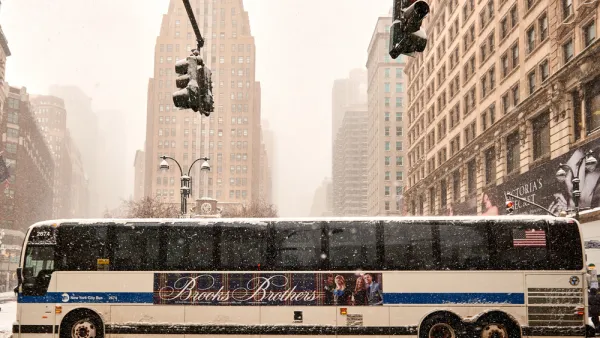The news about the decline of bus ridership around the country is making the rounds again. The future of bus transit as we know it seems to be in question.

David Harrison was the first to raise the alarms about declining bus ridership in August, with an article headlined by concern for the threat of declining ridership to the future of transit systems. "A staple of American urban life—the city bus—is in a state of steady decline," writes Harrison in the lede for the Wall Street Journal, which might be behind a paywall for some readers.
Leah Binkovitz followed that article with coverage for The Urban Edge that will be more accessible that the Wall Street Journal, tying the narrative back to the experience in Houston, which has proven to be an outlier after a bus system redesign in 2015.
Jeff Spross also followed up on the Wall Street Journal article. Here's Spross's take on the situation with bus transit, summarized:
You might be inclined to ask, so what? There are still subways, and people have cars. But the struggles of city buses are actually a microcosm for the full sweep of America's economic dysfunction. And like many parts of the economy, it never truly recovered from the Great Recession.
Another article from this month provides a local case study for the decline in bus ridership. Yonah Freemark wrote for Streetsblog USA of Los Angeles' declining bus ridership in a time of massive expansion of the regional rail system. That decline is placed in context of a popular narrative about Los Angeles achieving some kind of public transit enlightenment. The truth, according to Freemark, "is a little less dramatic," because "L.A.’s transit service was never that bad, while its purported transit renaissance has yet to translate into more people opting for buses and trains." The article includes an in-depth critique of the Los Angeles County Metropolitan Transportation Authority (Metro) transit system.
Planetizen's ongoing coverage of bus ridership last saw a crest in early 2017, when bus ridership data showed declines in Los Angeles and Tampa Bay, and transit ridership declined (rail included) in Washington, D.C. and Denver.
FULL STORY: America’s Buses Lose Riders, Imperiling Their Future

Analysis: Cybertruck Fatality Rate Far Exceeds That of Ford Pinto
The Tesla Cybertruck was recalled seven times last year.

National Parks Layoffs Will Cause Communities to Lose Billions
Thousands of essential park workers were laid off this week, just before the busy spring break season.

Retro-silient?: America’s First “Eco-burb,” The Woodlands Turns 50
A master-planned community north of Houston offers lessons on green infrastructure and resilient design, but falls short of its founder’s lofty affordability and walkability goals.

Test News Post 1
This is a summary

Analysis: Cybertruck Fatality Rate Far Exceeds That of Ford Pinto
The Tesla Cybertruck was recalled seven times last year.

Test News Headline 46
Test for the image on the front page.
Urban Design for Planners 1: Software Tools
This six-course series explores essential urban design concepts using open source software and equips planners with the tools they need to participate fully in the urban design process.
Planning for Universal Design
Learn the tools for implementing Universal Design in planning regulations.
EMC Planning Group, Inc.
Planetizen
Planetizen
Mpact (formerly Rail~Volution)
Great Falls Development Authority, Inc.
HUDs Office of Policy Development and Research
NYU Wagner Graduate School of Public Service




























